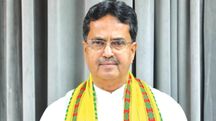Tripura: Forest Research Centre develops alternative energy source
 Tripura: Forest Research Centre develops alternative energy source
Tripura: Forest Research Centre develops alternative energy sourceThe Forest Research Centre for Livelihood Extension (FRCLE), Tripura, which runs under the direct observation of Rain Forest Research Institute Jorhat, has developed ‘biochar’—an alternative energy source that can be used instead of coal and firewood.
Biochar is charcoal used as a soil amendment for both carbon sequestration and soil health benefits. Biochar is a stable solid, rich in carbon, and can endure in soil for thousands of years.
Also read: Farmers in Tripura to get healthy with ‘nutritional gardens’
The project funded by Ministry of earth sciences had been undertaken here in Tripura for the first time in the Northeast and the local researchers have said that they had succeeded to develop good quality of ‘biochar’ which could be used for energy, cosmetics industry and in fact as soil enhancer.
“The Biochar is known for multifaceted use in the industrial sector and agricultural sectors. The earlier research that has been done in several countries like South America, North America, Brazil, African countries and some other European countries already started using it in the industry. In Tripura we have started the project after we got approval from the ministry of earth sciences. Now, we are done and need some help from the government to extend the technology to the people—the stakeholders”, said Ajoy Debbarma, the principal investigator of the project.
Also read: Tripura gets its first waterway with River Gomati approved as protocol route
Explaining the project, he said, “This is an eco-friendly project. Here you need not burn anything. It is just that you collect bio-mass that can be waste material of any sawmill or Agarbatti manufacturing units or so and burn it in a certain level of temperature in the absence of oxygen—in straight words in a closed chamber so that oxygen cannot influence the healing process. This process is called pyrolysis. And the end-product that comes is the biochar”.
Debbarma also said, in our study we have found that this bio-char has an effective impact on the soil. We have experimented it in certain species of plants where we have noticed good survival rate of the plants. Now we are planning to execute the experiment in a broader sphere. We will soon approach the forest department to allot us 1 acre of land where we will try this in four other species of plants, he added.
Also read: Tripura: No harsh impact over AMPHAN as moderate rains predicted
On the energy impact, he said, the calorific value of Bio-char is almost similar to coal and if everything falls in the right direction, it can replace coal as a renewable energy source in the industrial sector. “As of now, we can produce 100 kilograms of biochar from 300 kilograms of bio-mass which is a good ration if compared to the international researchers. And, we feel if the government extends support to us, soon we will reach the people of the stat with this technology”, hoped Ajoy. Meanwhile, two experts from Maulana Azad National Institute of Technology Dr. Suresh and Dr Dinesh Meena from RFRI Jorhat are also involved in this project as designer and chemical substance analyzer.
Readers like you make Inside Northeast’s work possible.
To support our brand of fearless and investigative journalism, support us HERE.
Download:
The Inside Northeast app HERE for News, Views, and Reviews from Northeast India.
Do keep following us for news on-the-go. We deliver the Northeast.
Copyright©2026 Living Media India Limited. For reprint rights: Syndications Today









